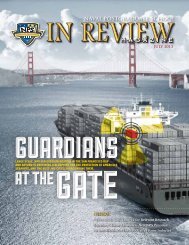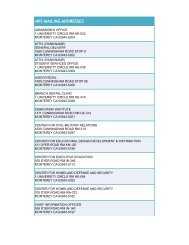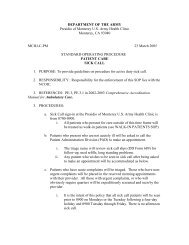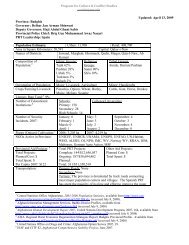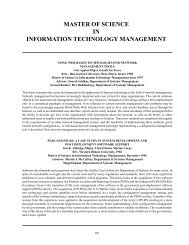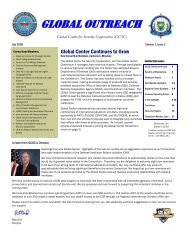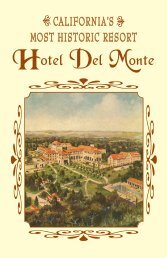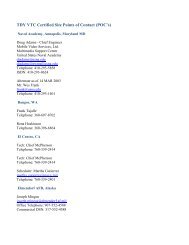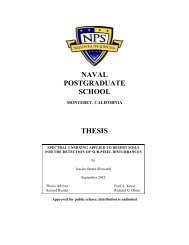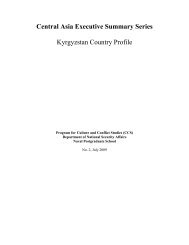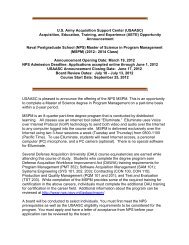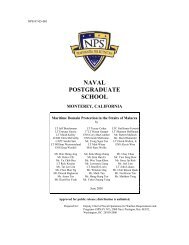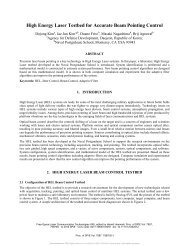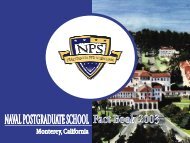October 2000 Newsletter - Naval Postgraduate School
October 2000 Newsletter - Naval Postgraduate School
October 2000 Newsletter - Naval Postgraduate School
You also want an ePaper? Increase the reach of your titles
YUMPU automatically turns print PDFs into web optimized ePapers that Google loves.
PROJECT NOTES<br />
SABBATICAL BRINGS PROFESSORS TO GRADUATES, continued from page 18<br />
including recommendations on training, and summaries of<br />
Navy ocean circulation and tide models, and surface wave<br />
models.<br />
In addition to interacting with the staff of the centers and<br />
facilities, they took every opportunity to visit with other<br />
METOC officers assigned to ships and staffs in the area.<br />
These ranged from training sessions with detachments<br />
primarily supporting airfields, to brainstorming with submarine<br />
group oceanographers. They also visited with other local<br />
government and research meteorological and oceanographic<br />
facilities, such as Scripps Institute of Oceanography, University<br />
of Tokyo, Old Dominion University, University of Cadiz,<br />
National Weather Service, and National Ocean Service, and<br />
facilitated Navy contacts with these institutions. At dockside,<br />
they were able to tour the spaces and examine the equipment<br />
used by OA divisions and Mobile Environmental Teams on a<br />
number of ships. They flew out to the carriers USS Enterprise<br />
off Norfolk, and USS Eisenhower in the Arabian Gulf, for<br />
overnight stays.<br />
Professor Wash has been a faculty member at NPS since<br />
1980, and it was particularly gratifying for him to see so<br />
many of his former students enjoying successful careers.<br />
Wherever he went, he solicited candid feedback from<br />
METOC alumni on their experiences here at NPS. These<br />
firsthand evaluations were overwhelmingly favorable, but also<br />
provided valuable insight into improvements that could be<br />
made. Wash and Rosenfeld also met some of our foreign<br />
alumni in Japan and Spain who spoke very highly of their<br />
time at NPS and were grateful for the education they received<br />
and the kindnesses they were shown. Professors Wash and<br />
Rosenfeld were the lucky recipients of their hospitality in<br />
TROPICAL CYCLONE TRACK FORECASTING, continued from page 19<br />
A beta test of the expert system module was carried out at<br />
the NPS late in 1999. Research Associate Professor Patrick<br />
Harr, Research Assistant Professor Elizabeth Ritchie and<br />
Meteorologist Mark Boothe participated in the simulated<br />
real-time test of the expert system module. This beta test was<br />
a valuable learning experience and led to a number of<br />
improvements in the module. The test was successful in the<br />
sense of correctly rejecting nearly all erroneous 72-hour track<br />
forecasts. Even though the Joint Typhoon Warning Center<br />
had their best year ever, we were able to show that the expert<br />
system had the potential to help them be even better.<br />
return.<br />
Prior to embarking on the sabbatical, Professors Wash and<br />
Rosenfeld anticipated that much of their interaction would<br />
be with the officers and civilians. One of the unexpected<br />
pleasures on the trip was to work with so many bright and<br />
engaging enlisted personnel. For the most part, they were<br />
eager to learn new things and many sought out the professors<br />
to ask questions. In addition, the professors met many<br />
junior officers at these centers who were in their first or<br />
second METOC tour. These officers had many questions<br />
about NPS and were anxious to learn about the METOC<br />
curricula. Wash and Rosenfeld look forward to greeting<br />
these officers when they arrive at NPS for their graduate<br />
education tour.<br />
Prior to leaving each center or facility, Wash and Rosenfeld<br />
briefed the Commanding Officer (CO) on what they had<br />
learned – both good points and bad – about the command’s<br />
operations. They presented detailed suggestions and are<br />
following this up with a written report to each CO. They<br />
plan to compile their findings and recommendations into a<br />
comprehensive report to be presented to CNMOC and<br />
ONR. Wash and Rosenfeld plan to share their observations<br />
with their METOC NPS colleagues through a seminar on<br />
their experiences. These forward-deployed professors<br />
returned to NPS this fall with great respect for the METOC<br />
officers, sailors and staff, and a much better understanding of<br />
how they serve the fleet and the problems that they face and<br />
must solve. In addition, they hope their findings will<br />
improve the NPS METOC curricula in meeting the challenge<br />
of educating the METOC officers of the future.<br />
Delivery of the Expert System<br />
Again with some special funding from SPAWAR, a preliminary<br />
version of the expert system was delivered in May <strong>2000</strong><br />
for training and familiarization by the forecasters. A final<br />
version was delivered in early July, and the forecasters have<br />
been utilizing the expert system as a primary tool in their<br />
forecast process. Half-way through the <strong>2000</strong> western North<br />
Pacific tropical cyclone system, the Joint Typhoon Warning<br />
Center is having another record-breaking year for accuracy.<br />
They credit the Systematic Approach Expert System developed<br />
at NPS for contributing to that success.<br />
NPS Research page 21<br />
<strong>October</strong> <strong>2000</strong>



